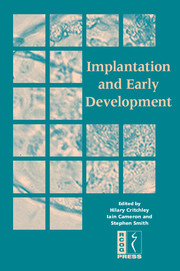Book contents
- Frontmatter
- Contents
- DECLARATION OF INTEREST
- Participants
- Preface
- SECTION 1 PREPARATION FOR IMPLANTATION – THE UTERINE ENVIRONMENT
- 1 Endocrine and paracrine signalling in the human endometrium: potential role for for the prostanoid family in implantation
- 2 Immunology of implantation
- 3 Progestin-indusced decidualisation promotes human endometrial haemostasis and vascular stabulity
- 4 Adhesion molecules and implantation
- 5 Vascular growth and modelling in the endometrium
- 6 Tissue remodelling the fetal-maternal interface: the regulation of matrix metalloproteinase 9 transcription
- 7 Embryo interactions in human implantation
- 8 Experimental models of implantation of the human embryo: reconstructing the endometrial–embryo dialogue in vitro
- SECTION 2 THE EMBRYO
- SECTION 3 LESSONS FROM ANIMAL MODELS (TRANSGENICS) AND NOVEL TECHNOLOGIES
- SECTION 4 CLINICAL SEQUELAE
- SECTION 5 CONSENSUS VIEWS
- Index
3 - Progestin-indusced decidualisation promotes human endometrial haemostasis and vascular stabulity
from SECTION 1 - PREPARATION FOR IMPLANTATION – THE UTERINE ENVIRONMENT
Published online by Cambridge University Press: 05 June 2014
- Frontmatter
- Contents
- DECLARATION OF INTEREST
- Participants
- Preface
- SECTION 1 PREPARATION FOR IMPLANTATION – THE UTERINE ENVIRONMENT
- 1 Endocrine and paracrine signalling in the human endometrium: potential role for for the prostanoid family in implantation
- 2 Immunology of implantation
- 3 Progestin-indusced decidualisation promotes human endometrial haemostasis and vascular stabulity
- 4 Adhesion molecules and implantation
- 5 Vascular growth and modelling in the endometrium
- 6 Tissue remodelling the fetal-maternal interface: the regulation of matrix metalloproteinase 9 transcription
- 7 Embryo interactions in human implantation
- 8 Experimental models of implantation of the human embryo: reconstructing the endometrial–embryo dialogue in vitro
- SECTION 2 THE EMBRYO
- SECTION 3 LESSONS FROM ANIMAL MODELS (TRANSGENICS) AND NOVEL TECHNOLOGIES
- SECTION 4 CLINICAL SEQUELAE
- SECTION 5 CONSENSUS VIEWS
- Index
Summary
Overview
During human implantation, endovascular trophoblast invasion occurs within a matrix of decidualised stromal cells that are ideally positioned to mitigate the associated threat of pregnancy-terminating local haemorrhage. Observations made by in situ hybridisation and immunohistochemistry of endometrial sections, together with in vitro studies of human endometrial stromal cells (HESCs), indicate that progestin-induced decidualisation creates a pro-haemostatic, vascular-stabilising milieu that resists bleeding. Thus, decidualisation is associated with coordinated upregulation in the expression of:
• tissue factor (TF), which promotes haemostasis by enhancing fibrin deposition via thrombin generation
• plasminogen activator inhibitor 1 (PAI-1), the fast inactivator of the primary fibrinolytic agent, tissue plasminogen activator (tPA).
Coincidently, the peridecidual cell extracellular matrix (ECM) becomes enriched in basal laminar-type proteins, which reflects the reciprocal synthesis of new ECM proteins and inhibition in their degradation. ECM degradation is initiated by surface receptor-bound urokinase (urokinase plasminogen activator, uPA). However, the plasmin-forming activity of this uPA is inhibited by elevated levels of PAI-1 stemming from progesterone-regulated decidualisation. Plasmin can degrade several ECM proteins and activates the zymogenic form of matrix metalloproteinases (MMPs), which degrade the bulk ECM components. Therefore, lower plasmin output results in a profound inhibition of ECM-degrading activity, which is complemented by direct progestin inhibition of the synthesis by HESCs of at least two members of the MMP family, MMP1 and MMP3. This coordinated inhibition of proteolysis strengthens the perivascular ECM support scaffolding. The resulting stabilisation of the endometrial vasculature in a pro-haemostatic milieu protects against bleeding during endovascular trophoblast invasion.
Keywords
- Type
- Chapter
- Information
- Implantation and Early Development , pp. 32 - 48Publisher: Cambridge University PressPrint publication year: 2005



